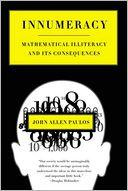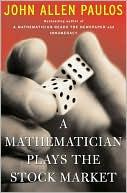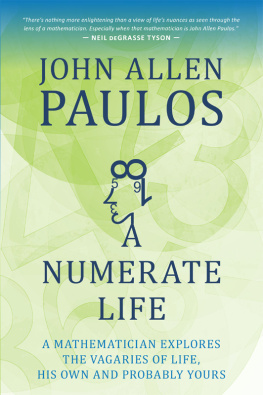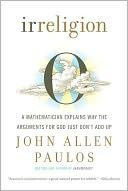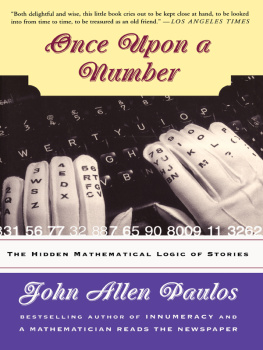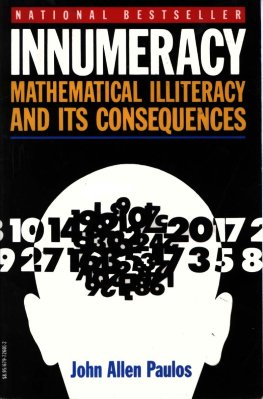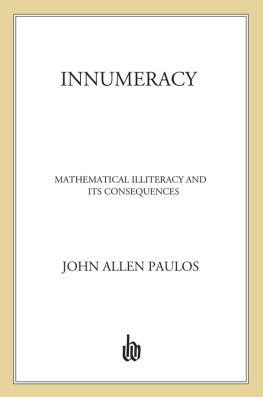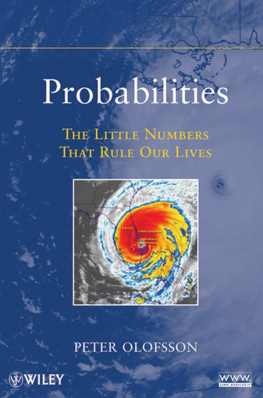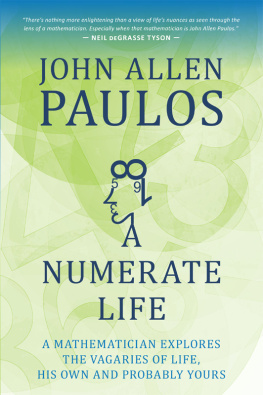Yikes! Look at how thick my hair was. Looking over an old photograph in an album arouses an odd complex of emotions not too dissimilar from those elicited by reading over an old book one has written. Depending on the picture and the book, there are varying proportions of pride, self-regard, shock at ones youth, sometimes even recoil. Digitally enhancing the photo (except perhaps to remove that smear of spaghetti sauce on the chin) or significantly altering the book seems a bit of a cheat, but annotating the photo or writing a new preface to the book seems quite appropriate. That I have done on the occasion of this new edition of Innumeracy: Mathematical Illiteracy and Its Consequences, twelve years after the original Hill and Wang publication in early 1989.
Not only is Innumeracy still around, but unfortunately the condition is as well. Mathematical solecisms of one form or another are a bit like piles of garbage; no matter how often theyre picked up, they soon collect again. My subsequent book, A Mathematician Reads the Newspaper, and the Whos Counting column Ive written for the last couple of years for ABCNews.com are further attempts to haul some of this trash away. Despite these and many other efforts, overblown health scares remain ubiquitous. Stories about miracles and conspiracies have not disappeared, nor have political and economic spin doctors. The same dreary litany regarding the poor performance of American mathematics students appears at regular intervals. And in a million and seventeen different ways, misperceptions about probability and risk are apparent wherever we turn.
Are things any better? The question is, of course, too vague to answer, but I do think, despite the stunning innumeracy of so many people (including those in high places), that there is a greater awareness of the importance of numbers, probability, logic, and mathematics generally than there was when this book was first published. In recent years biographies of the mathematicians Paul Erdos, Ramanujan, and John Nash have sold well, movies like Good Will Hunting and Pi with a mathematical theme have attracted mainstream audiences, the plays Copenhagen and Proof have been Broadway hits, and books on cryptography, Fermats last theorem, and chaos have been very popular. And on a more prosaic level, we are even more awash in numbers, percentages, rates, probabilities, and statistics of all sorts than we were then, and their importance is obvious to more of us.
Id like to claim that Innumeracy helped lessen innumeracy and pique popular interest in mathematics, but being numerate, I know that correlation does not necessarily prove causation and that I can take credit for only 0.3952 percent of the improvement in our collective mathematical savvy. (I might be wrong about that last figure.) Alas, however, almost any major news event serves as a reminder of how far we have to go.
In the infamous presidential election of 2000, for example, many of the crucial issues were statistical in nature, but the commentators were almost always lawyers and journalists. Regression analyses of the Buchanan vote in the various Florida counties would have clearly demonstrated how much of an outlier Palm Beach County was. An examination of the tiny difference between Gore and Bush in the official vote totals, especially given the crude Florida election apparatus, would have shown it to be statistically meaningless. Distinguishing between the two men was, as I opined in The New York Times , a bit like measuring bacteria with a yardstick. The relatively huge blocks of votes open to varying interpretations (far larger than the difference between the candidates), the arc sine law of probability theory, and the necessary limitations of any voting system were among a number of other mathematical aspects of the case that deserved more attention than they received. (On the other hand, I was not thrilled at some of the attention they did receive. Election ties being something like Rorschach tests, my remarks about the election were cited by Chief Justice Charles T. Wells of the Florida Supreme Court in a dissent from his courts decision to allow the manual recount to continue. I was pleased to be mentioned, but also a little upset that my words were used to support a position with which I disagreed.)
The O.J. Simpson case is another example of a news story full of publicly unexplored mathematics. Consider, for example, Alan Dershowitzs defense argument that since fewer than one in a thousand men who batter their wives or girlfriends go on to murder them, the court should not have allowed testimony that Simpson battered his wife. The statistic is true but astonishingly irrelevant since it fails to take into account the obvious fact that there was a murder victim. Using Bayes theorem and some widely available crime statistics, one can conclude that if a man batters his wife or girlfriend and she later turns up dead, the batterer is the murderer more than 80 percent of the time, and this without any individuating circumstances or further evidence.
The brouhaha over Bible codes, fuzzy economics, the deadly frequency of medical errors, the width of the Internet, the Firestone-Ford tire saga, college ratings, millennial hype, dot-com mania, and the Kennedy curse are just a few more of the relatively recent stories that have had a significant mathematical component.
Innumeraccy also helped stimulate an ongoing debate about mathematical pedagogy. After the publication of the book, I wrote a short piece on five misconceptions about mathematics that collectively tend to make studying it a rather unappealing endeavor for most. The first and most pernicious of these misconceptions is that mathematics is nothing more than computation. The truth is that in many areas of the subject, mathematics has as much to do with computation as writing has to do with typing. Algorithms, rules, and drill are certainly not unimportant (as a few of the many reformers who took inspiration from the book seem to have claimed), but our mathematical problems result more from insufficient exposure to mathematics as a way of thinking and a set of intricately connected higher-level skills than from an inability to compute.
That math is a completely hierarchical subject is the second misconception. First comes arithmetic, then algebra, then calculus, then differential equations, abstract algebra, complex analysis, and so on. This is not necessarily so. (Once after making this point in a talk, I was asked what comes after advanced calculus. My interlocutor was a bit nonplussed when I responded serious gum disease.) There is a cumulative aspect to certain parts of mathematics, to be sure, but it is frequently less important than many realize, and intellectually respectable accounts of sophisticated notions often can be communicated to people with little mathematical background.
Storytelling is as effective an educational tool in mathematics as it is in other domains, and belief to the contrary is the third misconception. Moreover, mathematics and narration are not unrelated activities. Having briefly majored in both philosophy and English as an undergraduate, Ive always been very sensitive to the way stories, parables, vignettes, and sometimes even jokes help put formal mathematics into context, illustrate its limitations, and emphasize what should be a truism: that numbers and statistics always require interpretation. (Underscoring the complex interplay between stories and numbers has, in fact, been a leitmotif in several of my books.)
The fourth misconception is that math is only for the few. Of course, some people have more talent than others in mathematics, just as some write better than others, but we dont advise students to forget their English and literature courses if theyre not planning to be journalists or novelists. Almost everybody can develop a workable understanding of numbers and probabilities, of relationships and arguments, of graphs and rates of change and of the ubiquitous role these notions play in everyday life.

